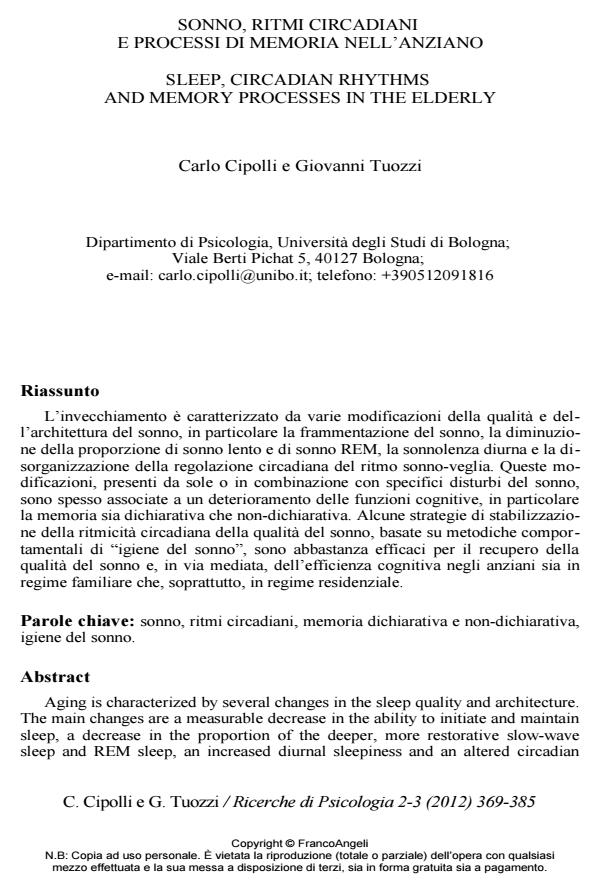Sonno, ritmi circadiani e processi di memoria nell’anziano
Titolo Rivista RICERCHE DI PSICOLOGIA
Autori/Curatori Carlo Cipolli, Giovanni Tuozzi
Anno di pubblicazione 2013 Fascicolo 2012/2-3
Lingua Italiano Numero pagine 17 P. 369-385 Dimensione file 474 KB
DOI 10.3280/RIP2012-002015
Il DOI è il codice a barre della proprietà intellettuale: per saperne di più
clicca qui
Qui sotto puoi vedere in anteprima la prima pagina di questo articolo.
Se questo articolo ti interessa, lo puoi acquistare (e scaricare in formato pdf) seguendo le facili indicazioni per acquistare il download credit. Acquista Download Credits per scaricare questo Articolo in formato PDF

FrancoAngeli è membro della Publishers International Linking Association, Inc (PILA), associazione indipendente e non profit per facilitare (attraverso i servizi tecnologici implementati da CrossRef.org) l’accesso degli studiosi ai contenuti digitali nelle pubblicazioni professionali e scientifiche.
L’invecchiamento e caratterizzato da varie modificazioni della qualita e dell’architettura del sonno, in particolare la frammentazione del sonno, la diminuzione della proporzione di sonno lento e di sonno REM, la sonnolenza diurna e la disorganizzazione della regolazione circadiana del ritmo sonno-veglia. Queste modificazioni, presenti da sole o in combinazione con specifici disturbi del sonno, sono spesso associate a un deterioramento delle funzioni cognitive, in particolare la memoria sia dichiarativa che non-dichiarativa. Alcune strategie di stabilizzazione della ritmicita circadiana della qualita del sonno, basate su metodiche comportamentali di "igiene del sonno", sono abbastanza efficaci per il recupero della qualita del sonno e, in via mediata, dell’efficienza cognitiva negli anziani sia in regime familiare che, soprattutto, in regime residenziale.
Parole chiave:Sonno, ritmi circadiani, memoria dichiarativa e non-dichiarativa, igiene del sonno.
- La psicologia dell'invecchiamento Rabih Chattat, in RICERCHE DI PSICOLOGIA 2/2021 pp.285
DOI: 10.3280/rip2021oa12613
Carlo Cipolli, Giovanni Tuozzi, Sonno, ritmi circadiani e processi di memoria nell’anziano in "RICERCHE DI PSICOLOGIA " 2-3/2012, pp 369-385, DOI: 10.3280/RIP2012-002015